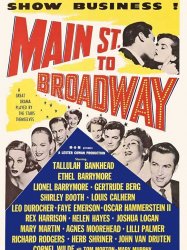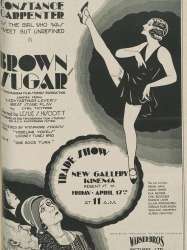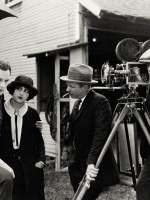Constance Carpenter est une Actrice Américaine née le 19 avril 1904 à Bath (Royaume-uni)

Constance Emmeline Carpenter (19 April 1904 – 26 December 1992) was an English-born American film and musical theatre actress.
Her debut as an adult performer was in the C. B. Cochran revue Fun of the Fayre in 1921. She made her Broadway debut in André Charlot's Revue of 1924. She remained in America for five years, appearing in was featured in The Charlot Revue of 1926 in 1925–26, after which she playe Mae in George and Ira Gershwin's Oh, Kay! in 1926 and Alice Carter in the Richard Rodgers, Lorenz Hart and Herbert Fields musical A Connecticut Yankee in which she played for a year, from November 1927.
In 1929 Carpenter returned to London, appearing in Cochran and Charlot productions. She appeared in pantomime at the Lyceum with Naughton and Gold in the Christmas 1930 season. Throughout the 1930s she divided her time between English and American engagements. In 1938 and 1939 she appeared in Terence Rattigan's long-running French Without Tears at the Criterion Theatre, London.
During World War II, Carpenter entertained troops throughout Europe, the Middle East and Asia. After returning to the United States in 1950, she took American citizenship.
Carpenter's most notable Broadway credit was The King and I in 1952 first as understudy to Gertrude Lawrence and then as the leading lady when Lawrence died during the run. In 1954 Carpenter appeared in London in An Evening with Beatrice Lillie. Her final Broadway appearance was in the Jerome Lawrence and Robert E. Lee play The Incomparable Max (1971), based on stories by Max Beerbohm.
Carpenter film credits were limited to Just for a Song (1929), Two Worlds (1930), and Brown Sugar (1931).
Source : Wikidata
Constance Carpenter

- Infos
- Photos
- Meilleurs films
- Famille
- Personnages
- Récompenses
Biographie
Carpenter was born in Bath, Somerset, in 1904, the daughter of Harold Carpenter and his wife Mabel Anne, née Cottrell, music hall artists. Her first appearance on stage was with fellow-pupils of the Lila Field Academy, a stage school whose alumni included Noël Coward and Ninette de Valois.Her debut as an adult performer was in the C. B. Cochran revue Fun of the Fayre in 1921. She made her Broadway debut in André Charlot's Revue of 1924. She remained in America for five years, appearing in was featured in The Charlot Revue of 1926 in 1925–26, after which she playe Mae in George and Ira Gershwin's Oh, Kay! in 1926 and Alice Carter in the Richard Rodgers, Lorenz Hart and Herbert Fields musical A Connecticut Yankee in which she played for a year, from November 1927.
In 1929 Carpenter returned to London, appearing in Cochran and Charlot productions. She appeared in pantomime at the Lyceum with Naughton and Gold in the Christmas 1930 season. Throughout the 1930s she divided her time between English and American engagements. In 1938 and 1939 she appeared in Terence Rattigan's long-running French Without Tears at the Criterion Theatre, London.
During World War II, Carpenter entertained troops throughout Europe, the Middle East and Asia. After returning to the United States in 1950, she took American citizenship.
Carpenter's most notable Broadway credit was The King and I in 1952 first as understudy to Gertrude Lawrence and then as the leading lady when Lawrence died during the run. In 1954 Carpenter appeared in London in An Evening with Beatrice Lillie. Her final Broadway appearance was in the Jerome Lawrence and Robert E. Lee play The Incomparable Max (1971), based on stories by Max Beerbohm.
Carpenter film credits were limited to Just for a Song (1929), Two Worlds (1930), and Brown Sugar (1931).
Le plus souvent avec
Filmographie de Constance Carpenter (3 films)
Actrice

Main Street to Broadway (1953)
Réalisé par Tay Garnett, James Anderson
Origine Etats-Unis
Genres Comédie dramatique, Comédie romantique, Musical, Romance
Thèmes Musique
Acteurs Mary Murphy, Agnes Moorehead, Rosemary DeCamp, Lionel Barrymore, Herb Shriner, Tallulah Bankhead
Rôle Self (uncredited)
Note60%






Brown Sugar (1931)
, 1h10Réalisé par Leslie S. Hiscott
Origine Royaume-uni
Genres Romance
Thèmes Adaptation d'une pièce de théâtre
Acteurs Constance Carpenter, Francis Lister, Helen Haye, Chili Bouchier, Eva Moore, Alfred Drayton
Rôle Lady Stella Sloane

Just for a Song (1930)
Genres Musical
Thèmes Musique, Adaptation d'une pièce de théâtre
Acteurs Lillian Hall-Davis, Roy Royston, Constance Carpenter, Cyril Ritchard, Syd Crossley
Rôle Jill
 Connexion
Connexion




